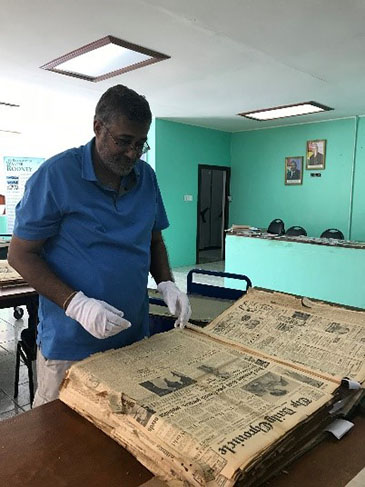Dear Editor,
The issue that has been raised about the name allocated or name change regarding the (Walter Rodney) National Archives seems to be punctuated with political posturing. Minette Bacchus was very candid and straightforward in her opinion. She pointed to the hypocrisy of the current leaders of the WPA, some of whom, are now far removed from the original ideals of Walter Rodney and have departed from the goals of the organization he help establish. One wonders who was the “big stick” elder statesman Eusi Kwayana blamed for this faux pas, and how such an “eye pass” could have transpired at a time when the WPA has purposefully accepted the role of being an apologist for the party implicated in the death of Dr. Walter Rodney.
Be that as it may, I write about a different, but a related matter, one that the current leaders of the WPA, and government officials should be concerned about, and for which they should be willing to take a lead. I am referring to the state of the historical documents and artifacts that are housed in the National Archives. For sure, Walter Rodney, who himself spent countless hours in the archives, would have been disheartened at the condition and the state of the materials housed there. With assistance from Malcolm Harripaul and Vishnu Bisram, I spent some time at the UG library, the Parliamentary library and the National Archives researching materials for the completion of a political biography of Jung Bahadur Singh. The most well-kept and efficaciously managed of these repositories of official and historical records was the Parliamentary Library located on the first floor of the Parliament building. Perhaps this was so because it is the information centre most frequented by our politicians. At the University of Guyana, I learned that the library was sealed off and it was being sanitized because a section that housed an original collection of pictures (donated by the family of Jung Bahadur Singh) was infested with bat and rat droppings.
By far, the worst experience was at the National Archives, the one place I spent most of my time. Not only were documented materials missing, but some artifacts were in such terribly fragile condition that I was told they simply could not be removed from their current location in the building. Although some newspapers and immigration records were neatly bound, others were so fragile that they literally broke up into pieces as I turned the pages. In some cases, it was apparent that pages were deliberately cut out from The Daily Chronicle and the Daily Argosy. One had to wear a pair of white gloves and a face mask to be able to review the materials. [I am attaching a photograph]. Clearly, the country does not seem to have a keen interest in preserving its most treasured historical records, whether in digital form or otherwise.
Walter Rodney may not have been bothered as to whether or not the National Archives carried his name. I am sure for him, the materials in the Archives that preserve part of the soul of the nation deserve immediate and urgent attention. Perhaps the President, a trained historian of high esteem, and a person who himself places a premium on the value of historical records, may be encouraged to direct his attention to this problem, even if he chooses to extricate himself from this controversy. Preserving our most precious documents that define who we are would surely put a smile on Rodney’s face.
Yours faithfully,
Baytoram Ramharack






